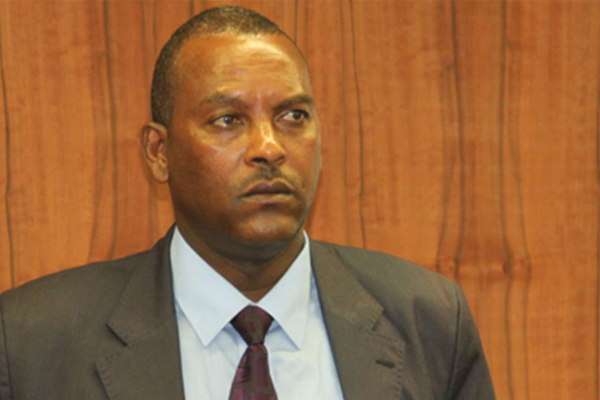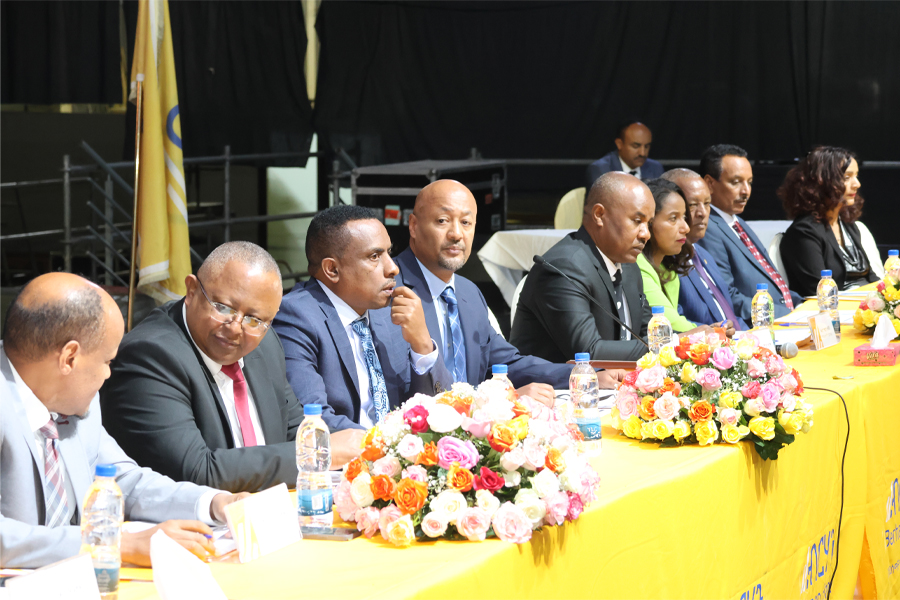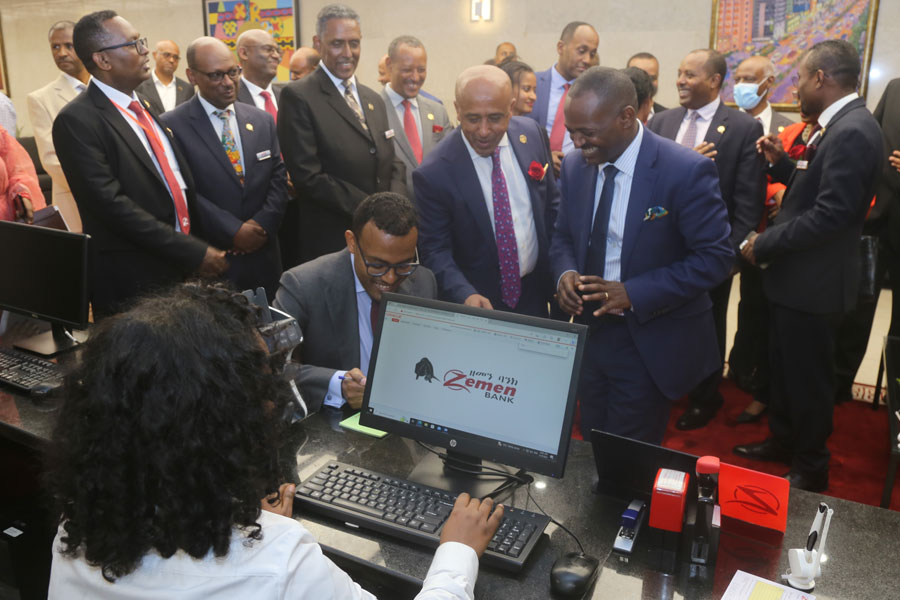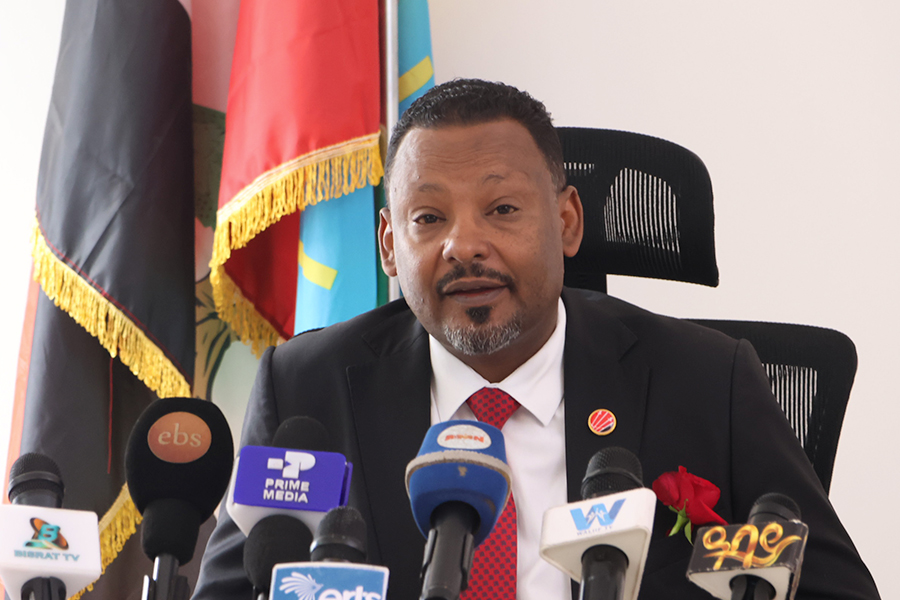
Fortune News | Jul 07,2024
Sep 3 , 2022
By BERSABEH GEBRE ( FORTUNE STAFF WRITER )
 Haji Ebsa
Haji Ebsa Haji Ebsa, director general of the Public Procurement & Property Authority, has begun rolling out an electronic public procurement system by automating the end-to-end process. Dubbed “electronic-government procurement”, the system is hoped to simplify existing paper-based and manual procurement practices.
Public procurement accounts for 64pc of the annual federal budget and 14pc of the country’s gross domestic product (GDP). The federal government established a project office five years ago to assess the feasibility of employing a digitalised procurement system.
Three years ago, Perago Information Systems, a local IT firm, was hired to deploy a platform. Perago is also behind the government electronic service portal launched two years ago by the Ministry of Innovation & Technology. More than two dozen federal agencies provide 319 services through the portal.
Over the years, Haji and his team have been experimenting with the new system as a pilot with nine federal agencies. Last month, Haji decided to expand the system by making electronic procurement compulsory for 72 agencies. A graduate of the University of Greenwich, London, Haji served at the Ministry of Finance in various capacities for close to a decade before assuming his current position two years ago.
Two weeks ago, Haji instructed these institutions to submit their annual procurement plans for the electronic undertaking. Any procurement conducted outside the system would be non-binding, says Setege Gemeda, director of communications.
Reestablished last year, the Authority oversees public procurements under the auspices of the Finance Ministry. Last year, the Ministry issued a directive granting the Authority the mandate to manage the e-procurement system, including authorising users. These institutions are compelled to communicate about public procurements through a portal, including procurement plans, tendering, bid evaluations, and notification of awards.
There are some exceptions to this clause.
“Agencies will be allowed to conduct manual procurements in case of system breakdown,” said Setege.
Officials at the Authority selected relevant entities of the 174 federal agencies using two parameters: the availability of a skilled workforce to conduct e-procurements and the Integrated Financial Management Information System (IFMIS) deployment. The latter looks to improve public financial management and asset administration. The federal government has been implementing IFMIS in public agencies since 2019.
The Ministry of Revenues (MoR) is among the agencies that have been implementing an e-procurement system for two years. However, it has not been using the system fully. Understaffing to carry out electronic procurements is a significant setback, says Asheber Regasa, director of treasury and finance.
Federal legislators have apportioned a 2.7 billion Br budget for the Ministry this year.
“Thus far, the Ministry is using the system for miscellaneous procurements,” said Asheber.
Experts contend that the system does not require staff with advanced skillsets to operate. Ewnatu Abera, chief executive officer (CEO) of Perago Information Systems, a company with 45 employees, believes a limited team can handle the job.
Administrators of federal agencies say suppliers are reluctant to register for the electronic system. Vendors and suppliers enlisted in the federal manual public procurement scheme reached 50,000. However, no more than 2,200 are listed under the e-procurement system.
Shiferaw Mitiku, assistant professor at Addis Abeba University, specialises in logistics and supply chain management. He observed that the electronic system is less exposed to corruption to reduce costs. A study he conducted two years ago estimates that the electronic system can reduce procurement costs by 16pc.
“It eliminates the involvement of local agents,” he said.
Most international companies participate in public procurement bids through agency agreements with domestic companies. The suppliers include commissioners and service fees from local partners, which are transferred to buyers.
Solomon Nigussie, deputy director of the Ethiopian Pharmaceuticals Supply Agency (EPSA), hopes adapting the e-procurement system will enable the Agency to reach out to more international suppliers. The Agency sources over 90pc of its supplies from foreign manufacturers; however, its dealings have been limited to four multinational companies.
“We can only manage to reach out to a few international companies,” said Solomon.
Reestablished in 2007, the Agency supplies over 1,000 pharmaceuticals and medical equipment to state-run health institutions and private facilities through 19 branches. It depends on a revolving fund to buy drugs and medical equipment. Last year, the Agency supplied public health institutions with drugs and medical equipment valued at 51 billion Br.
Perago Information Systems assisted the Agency in automating the procurement of 10 essential medicines.
Solomon anticipates the system to be fully automated to access international suppliers and speed up the procurement process. It takes 200 days for the Agency to receive drugs after letters of credit are opened. Since 2019, the Agency has been using enterprise resource planning (ERP) solutions to manage its routine activities, from procurement and inventory control to supply chain operations.
“We’re discussing how to integrate the two systems,” said Solomon.
Shiferaw argues that rolling out a full e-procurement system requires strong legal support. Haji and his deputies sent a draft proclamation two months ago to the Council of Ministers, which repeals the 13-year-old law governing public procurement.
PUBLISHED ON
Sep 03,2022 [ VOL
23 , NO
1166]

Fortune News | Jul 07,2024

Radar | Oct 20,2024

Radar | Jul 13,2025

Fortune News | May 27,2023

Editorial | Jul 27,2024

Fortune News | Feb 10,2024

Fortune News | Aug 02,2025

View From Arada | Feb 10,2024

View From Arada | Jun 21,2025

Radar | Jul 28,2024

Dec 22 , 2024 . By TIZITA SHEWAFERAW
Charged with transforming colossal state-owned enterprises into modern and competitiv...

Aug 18 , 2024 . By AKSAH ITALO
Although predictable Yonas Zerihun's job in the ride-hailing service is not immune to...

Jul 28 , 2024 . By TIZITA SHEWAFERAW
Unhabitual, perhaps too many, Samuel Gebreyohannes, 38, used to occasionally enjoy a couple of beers at breakfast. However, he recently swit...

Jul 13 , 2024 . By AKSAH ITALO
Investors who rely on tractors, trucks, and field vehicles for commuting, transporting commodities, and f...

Oct 25 , 2025
The regulatory machinery is on overdrive. In only two years, no fewer than 35 new pro...

Oct 18 , 2025
The political establishment, notably the ruling party and its top brass, has become p...

Oct 11 , 2025
Ladislas Farago, a roving Associated Press (AP) correspondent, arrived in Ethiopia in...

Oct 4 , 2025
Eyob Tekalegn (PhD) had been in the Governor's chair for only weeks when, on Septembe...